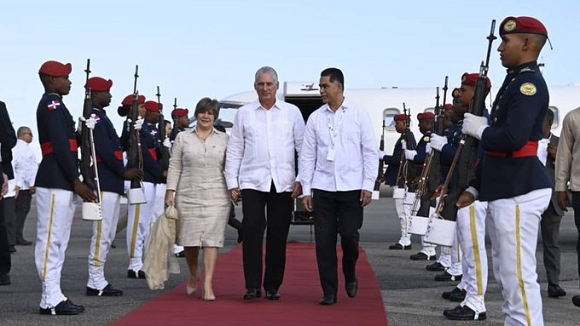The President of Cuba, Miguel Díaz-Canel, arrived today in the Dominican Republic at the head of the delegation of the Caribbean nation that will participate in the XXVIII Ibero-American Summit of Heads of State and Government.
Photo: Twitter/@BrunoRguezP.
The President of Cuba, Miguel Díaz-Canel, arrived today in the Dominican Republic at the head of the delegation of the Caribbean nation that will participate in the XXVIII Ibero-American Summit of Heads of State and Government.
The president commented before leaving on his Twitter account that "it is a pleasure to visit the sister land of the Generalissimo (Máximo Gómez) and be part of the cooperation efforts of Latin America."
Cuba is a founding member of the Ibero-American Conference, whose first Summit took place in Mexico in 1991, the Presidency of the Republic pointed out in the aforementioned social network.
President @DiazCanelB is in the Dominican Republic, leading the Cuban delegation that will attend the XXVIII #CumbreRD2023, which will meet in this nation.#Cuba is a founding member of the Ibero-American Conference, whose I Summit took place in Mexico, in the year 1991. pic.twitter.com/Y6KRf1d2fp
– Presidency Cuba 🇨🇺 (@PresidenciaCuba) March 24, 2023
In its capacity as president of the Group of 77 + China, Cuba will advocate at the XXVIII Ibero-American Summit for the promotion of more and better international cooperation, so necessary for the South, according to the Minister of Foreign Affairs Bruno Rodríguez.
The president indicated that he will be back in the Caribbean nation before Sunday to participate in the national elections, where the deputies of the X Legislature of the National Assembly of Popular Power (parliament) will be elected.
The Cuban president commented that cooperation is a noble and useful way of relating between nations, especially "in uncertain and challenging times like the ones we live in, it is a necessity and urgency."
Dominican government sources reported that at least 17 heads of state and government confirmed their participation in this meeting, the first of its kind to be held in person since the outbreak of the covid-19 pandemic, declared in March 2020.
The Summit is the highest instance of the Ibero-American Conference, a mechanism for political coordination and cooperation of the countries that make up the community.
It was created in July 1991 in Guadalajara, Mexico, with the aim of developing the ideals of Ibero-America based on dialogue, cooperation and solidarity.
This body is made up of Argentina, Bolivia, Brazil, Colombia, Costa Rica, Cuba, Chile, the Dominican Republic, Ecuador, El Salvador, Guatemala, Honduras, Mexico, Nicaragua, Panama, Paraguay, Peru, Uruguay, Venezuela, Spain, Portugal and Andorra.
In the context of the XXVIII Ibero-American Summit of Heads of State and Government, the Report on South-South and Triangular Cooperation in Ibero-America was presented, which highlights the active role of Cuba with more than 300 initiatives, Bruno Rodríguez assured today Parrilla, Minister of Foreign Affairs, on Twitter.
As he said, the Caribbean nation is driven by the duty to promote inclusive and solidary cooperation for the benefit of our peoples.
The document presented systematizes and analyzes the initiatives in which the countries of the region participated and includes 300 Triangular Cooperation actions and projects carried out in conjunction with multiple organizations and countries from different parts of the world.
One of the main contributions of the report is that it identifies the strategies that the Ibero-American countries promoted so that their cooperation could become more dynamic and adapt to a pandemic situation, as well as response tools to the covid-19 crisis and other global challenges such as the climate change, the loss of biodiversity or growing food insecurity.
The Summit will be inaugurated this Friday in Santo Domingo, Dominican Republic, in which the 22 countries of Latin America will participate, a region that reaches more than 684 million people.
(With information from Prensa Latina and the PCC)
